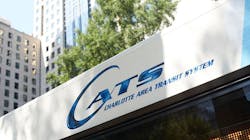Charlotte Area Transit System, eTransEnergy announce electric bus partnership
A pilot program and a public-private partnership has been approved by the Charlotte City Council for the Charlotte Area Transit System (CATS) and eTransEnergy to test the performance of battery-electric bus vehicles.
This collaboration, which has been supported by the Bloomberg Philanthropies American Cities Climate Challenge, will kick-off a 12-to-18-month pilot program to test 18 electric bus vehicles from three different manufacturers.
"eTransEnergy will support CATS with workforce training, performance data, procurement, electrical service management and installation of battery-charging infrastructure at CATS bus facilities," said CATS CEO John Lewis.
The pilot will allow CATS to collect data and assess vehicle performance while operating across the transit system in preparation for future phases. CATS is expected to receive the battery-electric vehicles by the end of 2021. Operation of the pilot program is anticipated to begin in early 2022.
Together, the city and eTransEnergy submitted a grant application to the Federal Transit Administration (FTA) and was awarded a $3,723,712 Low or No (LoNo) Emissions Grant Award which will fund six of the 18 buses. The other 12 buses will be funded through CATS' Capital Investment Program.
"We are excited to have developed a blueprint for public-private partnership with CATS to first pilot, then move to full-scale transit fleet electrification. We look forward to working with CATS and other transit authorities around the country to help them transition to clean energy transportation options," said Greg Fields, vice president of eTransEnergy.
The eTransEnergy battery electric bus pilot program supports the Strategic Energy Action Plan (SEAP), which strives to have city fleet and facilities be fueled by 100 percent zero-carbon sources by 2030 and sets a community-wide goal for Charlotte to become a low carbon city by 2050.
"Since 2018, the city of Charlotte has been working to achieve the vision of a low carbon Charlotte set forth in the SEAP," said City of Charlotte Chief Sustainability Officer Sarah Hazel. "Though 2020 brought incredible challenges on many fronts, it also highlighted the importance of this work, which is why it is so exciting to take this collaborative step towards reaching the ambitious goals we set for ourselves and our community."
After completion of the pilot program, eTransEnergy will support the transition of CATS’ entire bus fleet with a selected electric bus manufacturer.
"The goal of the American Cities Climate Challenge is to create more sustainable and resilient communities while unlocking the benefits of climate action. Our partnership with the city of Charlotte and Charlotte Area Transit System has initiated a foundational shift toward zero-emissions transportation and thus cleaner air for all the residents in the Charlotte region, " said Catherine Kummer, climate advisor with Natural Resources Defense Council to Charlotte as part of the American Cities Climate Challenge. "Charlotte is leading by example. The city's commitment to a full fleet of electric buses while piloting all technologies available will ensure public transit riders across the region have access to a bus system that works for them and the businesses that depend on riders being able to travel with ease and cleaner air."
CATS will continue to release details related to the pilot as it becomes available.



